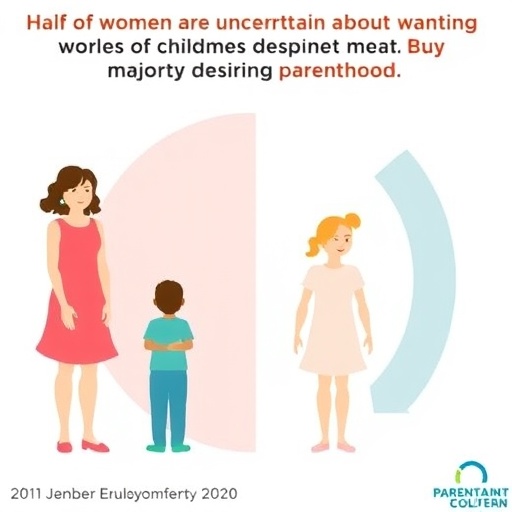As the United States grapples with a sustained decline in birth rates, recent research sheds new light on the complexity underlying women’s fertility intentions. A comprehensive study led by Ohio State University’s sociology experts reveals that the question of whether women will have children is far from a simple yes or no. Instead, many women express a range of uncertainties and nuanced feelings about their reproductive futures, challenging conventional assumptions about fertility trends and their drivers in contemporary society.
From the data analyzed, roughly 62% of women between the ages of 15 and 44 indicate an intention to have children at some point, a figure that has remained relatively stable over nearly two decades. Yet, what is striking in this research is the significant proportion of these women who do not express full confidence in realizing their intentions. Nearly half of those intending to have children report being only somewhat or not at all certain that they will follow through on this goal. This uncertainty, the researchers argue, is a critical but often overlooked dimension of fertility behavior that has important implications for understanding birth rate trends.
Delving deeper, the study highlights that this ambivalence about childbearing is not merely a reflection of external circumstances but also varies by socioeconomic status. Women with higher incomes and educational attainment tend to be more confident in their intentions, although even among college-educated women, certainty has experienced a notable decline in recent years—from 65% being “very sure” in 2014 to just over half by 2018. Such trends suggest that factors influencing fertility decisions are evolving in ways that transcend simple economic or educational metrics.
.adsslot_Exmh9wY3Ts{width:728px !important;height:90px !important;}
@media(max-width:1199px){ .adsslot_Exmh9wY3Ts{width:468px !important;height:60px !important;}
}
@media(max-width:767px){ .adsslot_Exmh9wY3Ts{width:320px !important;height:50px !important;}
}
ADVERTISEMENT
Adding complexity to the picture, the intensity of the desire to have children emerged as a significant factor in this research. Not all women who intend to have children express strong emotional or motivational commitment to the goal. Intriguingly, as many as 25% of childless women who desire children indicate that they would not be significantly upset if they ended up remaining childfree. This detachment or ambivalence toward the outcome represents a paradigm shift from traditional attitudes and points to broader cultural changes regarding family formation and identity.
Younger women, in particular, are more likely to express this openness to diverse life pathways, with some even embracing childfree futures without distress. These tendencies have increased over time, reflecting shifting social norms and possibly greater personal autonomy in defining life satisfaction beyond parenthood. This suggests that the observed decline in U.S. fertility rates may be driven as much by changing attitudes as by economic or structural barriers.
The researchers also explored popular hypotheses attributing the fertility decline to broader societal anxieties, such as pessimism about the future—environmental degradation, economic instability, and political uncertainty. Contrary to expectations, their analysis found little evidence that such societal-level concerns directly shape individuals’ childbearing intentions. Instead, personal satisfaction with one’s own life circumstances stands out as a more potent predictor of fertility goals.
This insight emerged from a supplementary study involving the American Trends Panel, a nationally representative survey of nearly 3,700 individuals. Findings demonstrated that individuals reporting dissatisfaction with their own personal lives were less likely to anticipate having children, while worries about the broader community or future societal challenges did not significantly alter their reproductive plans. This challenges the prevailing narrative that young adults’ hesitation to form families stems primarily from societal uncertainties.
Such findings underscore the multifaceted nature of fertility decisions in modern developed countries, complicating efforts to forecast demographic changes. On one hand, there remains a substantial base of latent desire for children; on the other, a pervasive uncertainty and ambivalence make the realization of these desires far from guaranteed. The hesitation and flexibility many women exhibit point to the importance of considering both psychological dimensions and material conditions in demographic research.
Furthermore, the research highlights that reproductive intentions cannot be captured fully by binary surveys or simplistic metrics. The shades of certainty, emotional resonance, and personal context play crucial roles in shaping how individuals approach family formation. This nuanced understanding has implications for policymakers, health practitioners, and demographers seeking to address the challenges posed by fertility declines.
Institutional contexts such as higher education, economic opportunity, and healthcare accessibility influence these reproductive choices, but so do cultural evolutions in values related to parenting, personal fulfillment, and alternative life paths. The intersection of these factors manifests in a landscape of reproductive uncertainty that defies straightforward explanation or prediction.
Ultimately, the work by Ohio State University’s sociology department and their collaborators illuminates the intricate dynamics underlying America’s declining birth rate, cautioning against overly simplistic interpretations. It suggests that future demographic shifts will hinge not only on changing material conditions but also on deep-seated changes in personal aspirations and social meanings attached to parenthood.
As demographic patterns continue to evolve globally, understanding these emerging uncertainties is critical. By integrating comprehensive survey data and sophisticated statistical analyses, this research opens new avenues for exploring how modern societies negotiate reproductive decisions amidst changing cultural and economic landscapes. The complex interplay of intention, uncertainty, and desire calls for interdisciplinary approaches to better anticipate and respond to the trajectories of population change.
Subject of Research: People
Article Title: Multiple dimensions of uncertainty in fertility goals: recent trends and patterns in the United States
News Publication Date: 2-Jun-2025
Web References:
http://dx.doi.org/10.1186/s41118-025-00251-6
Keywords: fertility intentions, birth rate decline, reproductive uncertainty, demographic trends, fertility goals, family formation, socioeconomic factors, personal satisfaction, cultural change
Tags: ambivalence towards parenthoodcomplexities of women’s reproductive choicesdeclining birth rates in the United Statesfactors influencing childbearing decisionsimplications of fertility behaviorOhio State University sociology studyreproductive futures of womensociological research on fertilitytrends in women’s parenting desiresuncertainty about childbearingunderstanding women’s desire for childrenwomen’s fertility intentions





